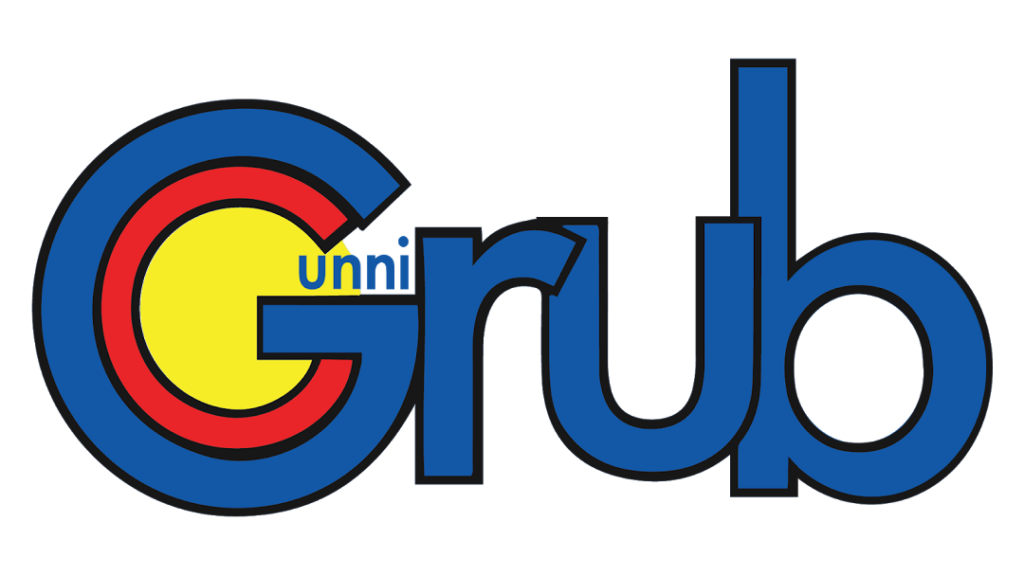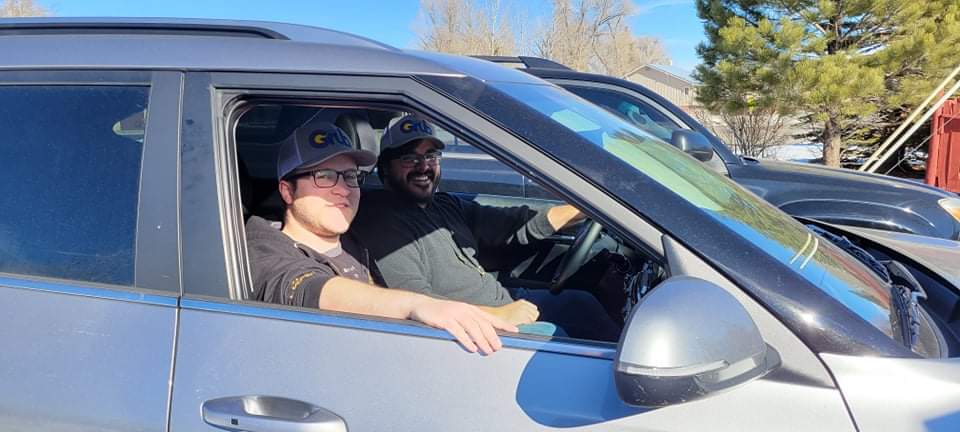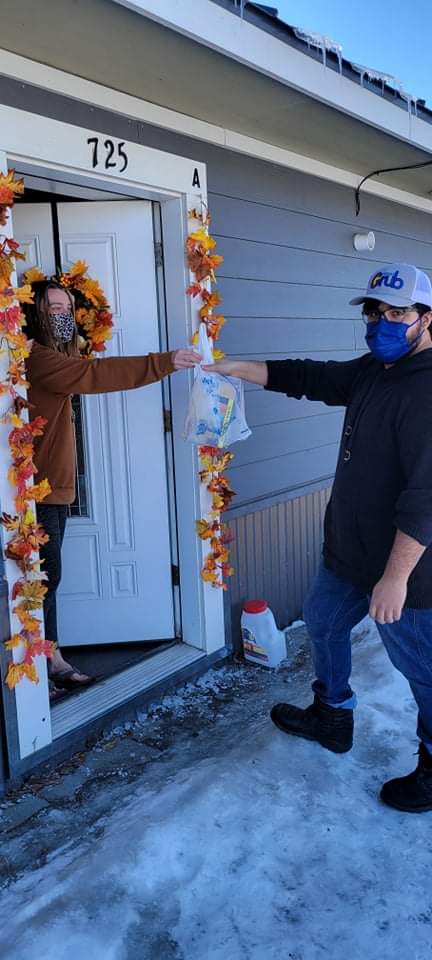
Luke Hylton and Erik Riego Jordan are the co-founders of GunniGrub, a delivery service launched in June 2021 bringing the community local staples for a flat fee. Hylton graduated from Western in 2020 with dual degrees in Psychology and English. Riego Jordan graduated from Western in 2019 with a Political Science degree and is currently studying law at Denver University.
Neither has formal business training in their background, but they recognized a need for a local delivery service during their time as Western students and set out on their own to make such a service a reality.
Riego Jordan was dismayed by the possibility that one of the larger food delivery apps, like GrubHub, DoorDash, or UberEats could take root in Gunnison. “They charge restaurants [a] minimum of 30 percent of the actual meal order, and they also still charge the customer, and on top of that, they mark up the prices,” he says of the typical business model of large delivery apps.
Established delivery companies have come under increased scrutiny in the last several years, with a slew of articles noting that these services take large cuts of small restaurants revenues, underpay and exploit drivers, and cut costs whenever possible to maximize profits. GunniGrub is looking to chart a different path, starting locally and establishing positive community relations before growing sustainably via satisfied return customers and positive relationships with local businesses.
With that in mind, Riego Jordan decided to make the dream of localized and humanized delivery a reality, going through the steps to officially incorporate the business and bringing Hylton on as a partner to work largely on the marketing and brand expansion aspects. The duo is also planning to onboard Western Computer Science student Cody Conner as Chief Technological Officer (CTO) when they receive more funding. Conner, whose academic pursuits centers on software engineering, has helped Riego Jordan and Hylton with the technological aspects of the business, particularly website development.
“We wanted to make something that was a little bit different than the standard capitalistic model that’s been presented,” says Riego Jordan, admitting that this new model GunniGrub has chartered has not been as lucrative as the behemoths in the delivery space right from the get-go. “Our drivers make more money than we do on a day-to-day basis,” he adds.
Under GunniGrub’s model, restaurants don’t pay any fees and delivery drivers now keep the entirety of the $5 standard delivery fee charged to customers (bumped up to $7 when it’s actively snowing outside), and any tips from customers. Thus far, the business has sparked enough interest to prove the viability of their concept but hasn’t reached the point where they can afford to pay their drivers well, give restaurants a fair deal, and pay themselves.
So Hylton and Riego Jordan have opted to please the restaurants and the drivers at their own expense thus far, but will aim to switch over to a subscription-based model soon, where subscribers pay $10 per month (or $25 for three months or $60 annually) in exchange for half-priced deliveries, exclusive discounts, and entry into raffles where subscribers can win prizes like $50 GunniGrub gift cards or three free months of GunniGrub subscription. Non-subscribers would still be able to order delivery, and delivery drivers would receive their full delivery fee even when subscription customers get a discount.

Hylton says that upon planned expansion either northward to Crested Butte (GunniGrub makes the odd delivery up to CB, but does not maintain a consistent presence) or east or westward to Salida or Montrose, Gunnison residents may be in line for a subscription discount as GunniGrub’s way of giving back to a town that is their shared community.
Riego Jordan views neighboring ski towns as the target growth market, with significant levels of affluence, lower populations (and thus a smaller customer base for the big apps) than a major city, as well as a density of mom-and-pop restaurants that historically don’t mesh well with large delivery services. Yet people in these towns still love their food and are willing to shell out for convenience. Benefitting GunniGrub is that outside of a few businesses doing their own delivery, there is little existing competition within the Gunnison Valley.
GunniGrub will also waive subscription fees to healthcare workers, first responders, and teachers. “It’s been really rough, [the pandemic], just on everybody, and it’s not much but I think it would make someone’s day if they’re sitting there in quarantine and they can’t go to their favorite restaurant and [are able to] get it delivered, or a health worker after a long day of dealing with cases…to just be able to have that little bit of happiness,” says Riego Jordan. “We’re just really looking at these big operations like GrubHub and DoorDash and it just rubs us the wrong way how they are just capitalizing off the pandemic, so we’re just trying to be the antithesis of that,” says Hylton.
Riego Jordan says that this subscription model is how GunniGrub can become profitable while still maintaining its business ethics and company ethos. Best of all, he says, restaurants actually benefit from the GunniGrub system, and aren’t being forced to choose between shrinking their margins or their customer base at the behest of a large delivery app, because GunniGrub takes nothing from the restaurants and doesn’t raise their food prices to pay itself. “We make money because they [the local restaurants] are so popular,” says Riego Jordan of the mutually beneficial relationship.
To make these expansion goals a reality, GunniGrub has actively sought out investment opportunities, and is on track to receive a large injection of capital should their growth remain on track. That money will be utilized to develop an app spearheaded by officially onboarding Conner, increase their server space (they are currently running two laptops as servers), boost their marketing campaign, and eventually expand the GunniGrub model outward.
When the subscription model does launch, Riego Jordan wants to plow some of the revenue into lowering the costs of GunniGrub’s services. “Food should not be limited by your finances,” he says. He notes that DoorDash has a subscription service of their own that boasts free delivery, but that they charge a one-dollar upcharge per item, sneakily tacking on fees that can add up quickly. Conversely, GunniGrub is seeking to be as transparent as possible in its transactions.

GunniGrub just launched a website which will streamline their ordering and delivery process, linking customers to the websites of all participating Gunnison restaurants (customers will still have to call in and pay over the phone for their orders) and having them complete a separate GunniGrub ordering form to secure their delivery. GunniGrub’s website currently lists 24 restaurants and coffee shops with their menus and phone numbers, along with Pawsitively Native Pet Boutique for your pet food needs.
This new system, firmly secured by the payment system Stripe, will replace the previous ordering system which relied on the usage of Facebook and its Messenger app. The duo said that they opted for this form of soft launch to help establish an initial presence in the community and become known as a localized source for delivery service, before investing in a unique website.
One psychological setback that GunniGrub has had to counter since its inception is the notion that their services are simply too good to be true, particularly for businesses that don’t have to offer up a cut to get onboard. Riego Jordan notes that a couple of the businesses that have not yet signed on may be under the impression that GunniGrub is some sort of DoorDash proxy aimed at slashing into their revenues and slimming their already-tight margins. Riego Jordan and Hylton are hopeful that the community, particularly college-aged students, will recognize GunniGrub as a more ethical model than many of the alternatives on offer in larger towns.
The recent launch of GunniGrub’s website will inevitably mean that they will require more drivers fulfilling orders. Currently, they have about 15 regular drivers, who enjoy the flexibility to accept or decline delivery jobs around their own scheduling preference. “There are no requirements; we ask that they do at least one order every month to keep them in the system,” says Riego Jordan. Frequently throughout the venture, Hylton and Riego Jordan find themselves making their own deliveries.
On the driver’s side, the pay is solid considering the light time commitment. GunniGrub says it aims to keep its drivers in the $7-8 per delivery range (if not more, depending on the generosity of customers), and adding that the average delivery time in Gunnison is about six minutes. They note that the flexibility offered by the gig, which offers some quick money to its drivers for small time commitments, is particularly ideal for college students. Riego Jordan and Hylton also provide education on how to write off miles driven on personal vehicles to save money on Tax Day.
Riego Jordan says that paying the drivers adequately is a critical component of not just maintaining worker satisfaction, but also customer satisfaction. “Everybody has DoorDash nightmare stories, where they’re like oh yeah, my sloppy joe got slammed into my door,” Riego Jordan says with a laugh. “If you pay your drivers enough, they’ll do better work.”

The most significant issue for GunniGrub when it comes to drivers involves balancing incoming orders with available staffing. GunniGrub didn’t want a surplus of drivers in its early days that limited their ability to make deliveries, but now the issue, particularly with the website launch and broader socioeconomic factors (exacerbated by the pandemic and broader labor trends), will be finding more workers to meet the anticipated demand increase.
“As soon as the website’s launched, we’re expecting to hit a couple hundred deliveries a week,” says Riego Jordan, noting that himself and Hylton will likely still complete deliveries until they can achieve a fully self-sufficient model. For Hylton, the relative lack of college students as customers has been surprising, with a large share of the current customer base being busy families.
In the short-term after the website launch, GunniGrub will boost their advertising efforts via flier distribution and a forthcoming Hulu ad, and Riego Jordan is looking to potentially bring his fiance into the business in a managerial, day-to-day operations role to take some stress off the duo.
For Riego Jordan and Hylton, the ultimate operational goal is to be able to seamlessly complete customer orders via their online app, reducing the ordering process to a single step that both pays the businesses and initiates the delivery process. Riego Jordan notes that the typical app costs over $100,000 to develop in the U.S., and that GunniGrub isn’t quite there yet financially, even as it strives to be soon.
For now, GunniGrub is taking great pride in its high customer satisfaction rate that leads to a roughly 95% customer retention rate. Riego Jordan and Hylton also derive satisfaction in providing quality delivery services to people under quarantine during a massive regional uptick in Covid-19 cases. Ultimately, how they treat the community and their workforce is their biggest selling point. Riego Jordan estimates that the average subscription customer will use their service 10 to 20 times per month and will appreciate the dual transparency and simplicity of GunniGrub’s economic model.
“The way that capitalism has been built in this country, people have forgotten that it’s not just about exploitation to get more money, it’s about people voting with their dollars, and that should be more important. If you pay people [well], they’ll provide better work. If you provide a good service, people will pay for it; it’s not that complicated,” says Riego Jordan, citing the company’s informal slogan of “guilt-free” delivery.
For students or others interested in becoming drivers for GunniGrub, you can reach out directly at gunnigrub@gmail.com to get a 1099 contract and start working. For deliveries, GunniGrub is open Mondays and Tuesdays as drivers are available, Wednesday and Thursday from 11am-8pm, Friday and Saturday from 11am-9pm, and Sunday from 9am-8pm. Hours may expand as needed. They can be found online at GunnigGrub.com
